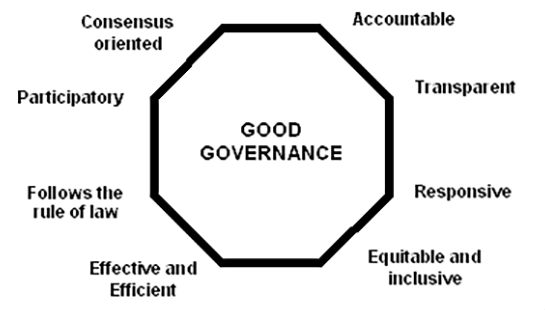Governance
Good Governance Week
- 21 Dec 2021
- 7 min read
For Prelims: Good Governance Day, Good Governance Week, Prashasan Gaon Ki Aur, Initiatives related to good governance, Principles of Good Governance.
For Mains: Significance Good Governance, principles in improving local level governance and related challenges.
Why in News
The Union Government is set to launch a nationwide 'Good Governance Week' from 20th December to 26th December, with the motto to redress and dispose of public grievances and improvise service delivery down to the village level
- Various events will be convened during the week under the campaign titled “Prashasan Gaon Ki Aur” aimed to be citizen-focused.
- 25th December is celebrated as ‘Good Governance Day’ to mark the birth anniversary of former Prime Minister Atal Bihari Vajpayee.
Key Points
- About:
- It is observed to celebrate the strides made by India in promoting citizen-centric governance and improving service delivery in line with Azadi ka Amrut Mahotsav celebrations to commemorate 75 years of progressive India.
- The series of programmes planned during the week will aim to highlight various good governance initiatives taken by the Centre.
- It will also include the inauguration of the Exhibition on Good Governance Practices.
- Events include:
- Ease of Living and Next Phase of Reforms for Reducing Compliance Burden
- Experience Sharing Workshop by DARPG on Best Practices.
- Mission Karmayogi - The Path Ahead.
- Good Governance Week Portal will also be launched during the occasion and all district collectors of states and union territories will be given access to the online portal to upload and share the progress and achievements.
- Prashasan Gaon Ki Aur" campaign will be launched with an aim to take good governance to the rural areas.
Governance
- About:
- It is the process of decision-making and the process by which decisions are implemented (or not implemented).
- Governance can be used in several contexts such as corporate governance, international governance, national governance and local governance.
- Eight Principles of Good Governance (as identified by the United Nations):
- Participation:
- People should have a voice in decision-making, either directly or through legitimate intermediate institutions that represent their interests.
- Rule of law:
- Legal frameworks should be fair and enforced impartially, particularly the laws on human rights.
- Transparency:

- Transparency is built on the free flow of information. Processes, institutions and information are directly accessible to those concerned with them, and enough information is provided to understand and monitor them.
- Responsiveness:
- Institutions and processes try to serve all stakeholders within a reasonable timeframe.
- Consensus orientation:
- Good governance requires mediation of the different interests in society to reach a broad consensus in society on what is in the best interest of the whole community and how this can be achieved.
- Equity:
- All groups, particularly the most vulnerable, have opportunities to improve or maintain their well being.
- Effectiveness and efficiency:
- Processes and institutions produce results that meet needs while making the best use of resources.
- Accountability:
- Decision-makers in government, the private sector and civil society organisations are accountable to the public, as well as to institutional stakeholders.
- Participation:
- Challenges to Good Governance in India:
- Women Empowerment:
- Women are not adequately represented in government institutions, and other allied sectors.
- Corruption:
- The high level of corruption in India has been widely perceived as a major obstacle in improving the quality of governance.
- Delay in Justice:
- A citizen has the right to avail timely justice, but there are several factors, because of which a common man doesn’t get timely justice. One such factor is lack of personnel and logistics under disposal of the court.
- Centralisation of Administrative System:
- Governments at lower levels can only function efficiently if they are empowered to do so. This is particularly relevant for the Panchayati Raj Institutions (PRIs), which currently suffer from inadequate devolution of funds as well as functionaries to carry out the functions constitutionally assigned to them.
- Criminalisation of Politics:
- The criminalisation of the political process and the unholy nexus between politicians, civil servants, and business houses are having a baneful influence on public policy formulation and governance.
- Environmental security, sustainable development.
- Challenges of globalisation, liberalisation and market economy.
- Women Empowerment:
- Indian Initiatives to improve Good Governance:
- Good Governance Index:
- GGI has been launched by the Ministry of Personnel, Public Grievances & Pensions to determine the status of governance in the country.
- It assesses the impact of various interventions taken up by the State Government and UTs.
- National e-Governance Plan:
- It has the vision to “make all government services accessible to the common man in his locality, through common service delivery outlets and ensure efficiency, transparency & reliability of such services at affordable costs to realise the basic needs of the common man.”
- Right to Information Act, 2005:
- It plays an effective role in ensuring transparency in governance.
- Other Initiatives: Setting up of NITI Aayog, Make in India programme, Lokpal, etc.
- Good Governance Index:






